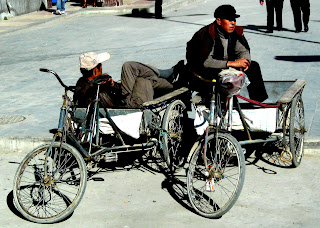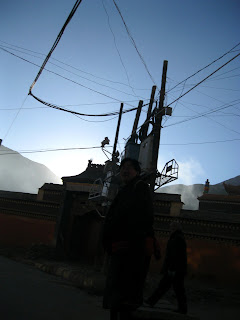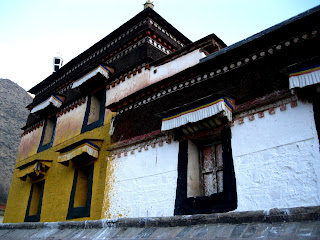The bus arrives late into Xiahe. It is dark and near freezing. My pack feels heavier than I remember. It cuts into my shoulders, digs into my lower spine. I walk out from the bus yard. Five men sit in the shadows, smoking from the backs of their wooden carts. “Taxi,” one man shouts like an insult. The others laugh, dislodging it like catarrh from the backs of their throats. I can just make out the twisted features of the two men closest to me. In daylight, they would be ugly. At night, they are hideous. I look down the road, peering into the murk. It is around two kilometres to the nearest affordable guesthouse. I get the sense that these men would sell their own grandmothers for a hundred Yuan. I start walking.
The street lamps are not bright; they produce just enough light to confirm their own presence. After ten minutes of stumbling through rubble alongside a corrugated iron fence and avoiding the phlegm emanating from shadowy figures, I decide it would be pertinent to check that I am at least heading in the right direction. I approach someone that looks like a monk and ask if the Labrang Monastery is up ahead. It is. Further into the dust and darkness I walk. There are fewer lights and fewer people. I am uncomfortable.
A silver sliver splits the blackness in front of me – the knife of a Tibetan man caught in the headlights of a passing car. Closer and to my left, a dog howls. A man pisses up against a wall. A Buddhist lecture booms from a loudspeaker in an alley, sounding more like a Hitler speech than a spiritual message. A child screams. A firecracker explodes. I want out.
In considerable pain, exhausted and a nervous wreck, I finally reach the guesthouse. The attached restaurant is packed with tired pilgrims, shovelling food into their gaping mouths. A man emerges from the flashing chopsticks and splashing grease, and tells me that the guesthouse is full. The look on my face must say it all because he starts flicking frantically through a registration book. After a while, he looks up smiling and suggests that there is a bed that I can share with a man for just thirty Yuan a night. I think back to the contorted faces of the cart men and say that I will think about it, already backing out of the door. I am outside again.
There is one more possibility – a Tibetan-run hostelry located further out of town. I walk to the river and arrive at the turning I need to take. The main road had been unwelcoming, unpleasant even, but this one is screaming, ‘Turn back, whitey. Turn back before it’s too late.’ I can just make out in the distance some wild dogs rooting around in a pile of rubbish, and three deformed figures, hunched around a fire. Beyond that there is impenetrable blackness.
100 metres; 200, 300, 400 metres into the nothingness I go. I am scared now. Bad things fill my head. The road ends at a hillside. This is not good. I root around in my pack for my torch, double-back and head down an alleyway, the only remaining option. The Chinese batteries in my torch are useless; the light dims to a pathetic halo. I look for any Tibetan script that indicates a hostel. Only concrete. I hear someone sweeping, scratching at the path with a broom. I head blindly towards the sound. A woman emerges from the dust. “Binquan?” I ask, failing to conceal the desperation in my voice. She points. There is a courtyard and there is light. There is a hostel. There is salvation.



